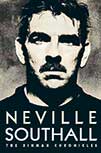 by Neville Southall
by Neville Southall
De Coubertin Books, £18.99
Reviewed by Mark O’Brien
From WSC 309 November 2012
The standard format for modern sports biographies is to start on the cusp of the subject’s defining moment – the race, the fight, the match of their life – and then flash back to their childhood to tell the story of their rise to the top. Neville Southall, record-breaking goalkeeper for Everton and Wales, kicks off his autobiography on a football pitch but instead of a glorious match at Goodison, Wembley or Cardiff Arms Park it’s the present day and he is being called a “fucking fat knobhead” by one of the troubled youngsters he now works with.
It quickly becomes clear that Southall has done everything slightly differently to other sportsmen. He states early on that he wants to show people that there is more to his personality than just the grumpy caricature that he became in many eyes and he succeeds up to a point.
From his beginnings in Llandudno through to the glittering heights at Everton, where he became the club’s most decorated player, then on a tour of English football’s less glamorous outposts when he ended his career as a wandering pair of gloves for hire, Southall talks constantly of a single-minded, overwhelming desire to improve as a keeper. After a while it’s hard not to wonder whether this obsession, especially with training, is born of a deep-seated lack of confidence.
Like Henry Skrimshander, the fictional baseball star in Chad Harbach’s The Art Of Fielding, Southall only ever seems at home in a sporting environment, one where social interaction is reduced to piss-taking and the rules are very simple: play, train, improve and play again.
He still seems quite guarded and loath to criticise too many of his former colleagues, apart from Everton’s disastrous management duo of Mike Walker and Dave Williams, but still he has a dry sense of humour and tells plenty of funny anecdotes, especially about the misadventures of the Welsh national team which appears to have been run like Dad’s Army.
Even when describing the rather melancholy end to his 751-game Everton career Southall manages to see the funny side. Told that Howard Kendall wants to speak to him ahead of a game at Elland Road he goes to the manager’s hotel room.
“‘You do know I love you,’ he said when I came in. He looked awful, like he had the weight of the world on his shoulders. To be honest, this wasn’t what I wanted to hear. Howard Kendall stood in his dressing gown with his bollocks hanging out telling you he loves you is not a good sight.”
Another of football’s less conventional characters, Pat Nevin, is spot on when he describes Southall as the classic eccentric with a complex personality. As a result The Binman Chronicles is a more interesting read than the average footballer’s life story.



